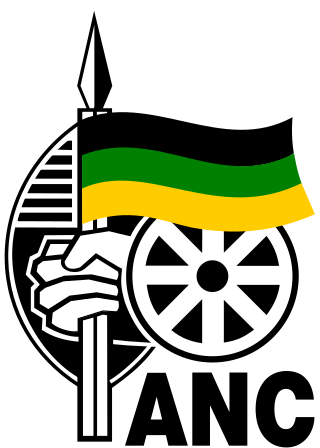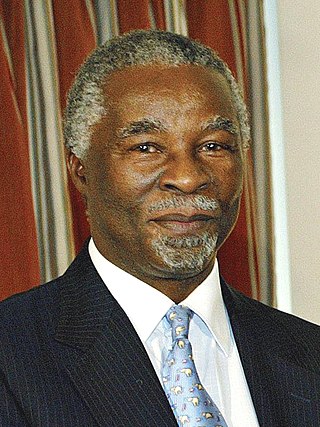National Party South Africa could refer to:
- National Party (South Africa) (1914-1997)
- National Party South Africa (2008) (2008-2019)
National Party South Africa could refer to:

The African National Congress (ANC) is a political party in South Africa. It originated as a liberation movement known for its opposition to apartheid and has governed the country since 1994, when the first post-apartheid election resulted in Nelson Mandela being elected as President of South Africa. Cyril Ramaphosa, the incumbent national President, has served as President of the ANC since 18 December 2017.

Thabo Mvuyelwa Mbeki is a South African politician who served as the 2nd democratic president of South Africa from 14 June 1999 to 24 September 2008, when he resigned at the request of his party, the African National Congress (ANC). Before that, he was deputy president under Nelson Mandela from 1994 to 1999.
Independent or Independents may refer to:

The president of South Africa is the head of state and head of government of the Republic of South Africa. The president directs the executive branch of the government and is the commander-in-chief of the South African National Defence Force. Between 1961 and 1994, the office of head of state was the state presidency.
Democratic Party and similar terms may refer to:

The Democratic Alliance (DA) is a South African political party which is a part of the current South African Government of National Unity (GNU). The party has been the second-largest in South Africa since its foundation in 2000. The party is broadly centrist, and has been attributed both centre-left and centre-right policies. It is a member of Liberal International and the Africa Liberal Network. The DA traces its roots to the founding of the anti-apartheid Progressive Party in 1959, with many mergers and name changes between that time and the present. The DA has a variety of ideologically liberal tendencies, including neoliberalism, social liberalism, classical liberalism, and conservative liberalism. The party draws its support predominantly from Afrikaans and English speakers, people aged over 35, and white South Africans, as well as the Indian and Coloured communities.

Helen Suzman, OMSG, DBE was a South African anti-apartheid activist and politician. She represented a series of liberal and centre-left opposition parties during her 36-year tenure in the whites-only, National Party-controlled House of Assembly of South Africa at the height of apartheid.

Anthony James Leon is a South African politician who served as leader of the opposition from 1999-2007 as leader of the Democratic Alliance (DA). He led the DA from its inception in 2000, until his retirement from leadership in 2007. Before that, he led the Democratic Party from 1994. He is the longest-serving leader of the official opposition in parliament since the advent of democracy in 1994. Although still a member of the DA, he served as the South African Ambassador to Argentina, Uruguay and Paraguay under the African National Congress government from 2009 to 2012.

A Volkstaat, also called a Boerestaat, is a proposed White homeland for Afrikaners within the borders of South Africa, most commonly proposed as a fully independent Boer/Afrikaner nation. The proposed state would exclude Afrikaans-speaking Coloureds but accept South Africans of English ancestry and other White South Africans, if they accept Afrikaner culture and customs.

White South Africans are South Africans of European descent. In linguistic, cultural, and historical terms, they are generally divided into the Afrikaans-speaking descendants of the Dutch East India Company's original colonists, known as Afrikaners, and the Anglophone descendants of predominantly British colonists of South Africa. In 2016, 57.9% were native Afrikaans speakers, 40.2% were native English speakers, and 1.9% spoke another language as their mother tongue, such as Portuguese, Greek, or German. White South Africans are by far the largest population of White Africans. White was a legally defined racial classification during apartheid.
National Alliance may refer to:
Afrikaner nationalism is an ethnic nationalistic political ideology created by Afrikaners residing in Southern Africa during the Victorian era. The ideology was developed in response to the significant events in Afrikaner history such as the Great Trek, the First and Second Boer Wars and the resulting anti-British sentiment and Anti-communism that developed among Afrikaners and opposition to South Africa's entry into World War I.

General elections were held in South Africa on 22 April 2009 to elect members of the National Assembly and provincial legislatures. These were the fourth general elections held since the end of the apartheid era.
The Progressive ANC Voters Network (PAVN) is a sub-party voting bloc organization that was formed by AIDS activist Zackie Achmat and other card-carrying members of the African National Congress on March 28, 2007. It is meant to push for greater representation and furtherance of progressivist ideals within the party.

South Africa, officially the Republic of South Africa (RSA), is the southernmost country in Africa. Its nine provinces are bounded to the south by 2,798 kilometres of coastline that stretches along the South Atlantic and Indian Ocean; to the north by the neighbouring countries of Namibia, Botswana, and Zimbabwe; to the east and northeast by Mozambique and Eswatini; and it encloses Lesotho. Covering an area of 1,221,037 square kilometres, the country has over 62 million people. Pretoria is the administrative capital, while Cape Town, as the seat of Parliament, is the legislative capital. Bloemfontein has traditionally been regarded as the judicial capital. The largest and most populous city is Johannesburg, followed by Cape Town and the busiest port city in sub-Saharan Africa, Durban.

The Congress of the People (COPE) is a South African political party formed in 2008 by former members of the African National Congress (ANC). The party was founded by former ANC members Mosiuoa Lekota, Mbhazima Shilowa and Mluleki George to contest the 2009 general election. The party was announced following a national convention held in Sandton on 1 November 2008, and was founded at a congress held in Bloemfontein on 16 December 2008. The name echoes the 1955 Congress of the People at which the Freedom Charter was adopted by the ANC and other parties, a name strongly contested by the ANC in a legal move dismissed by the Pretoria High Court.
Although the Democratic Alliance of South Africa in its present form is fairly new, its roots can be traced far back in South African political history, through a complex sequence of splits and mergers.
No Land! No House! No Vote! is a campaign by a number of poor people's movements in South Africa that calls for the boycotting of the vote and a general rejection of party politics and vote banking. The name is meant to imply that if government does not deliver on issues important to affected communities these movements will not vote.
Labour Party or Labor Party is a name used by many political parties.